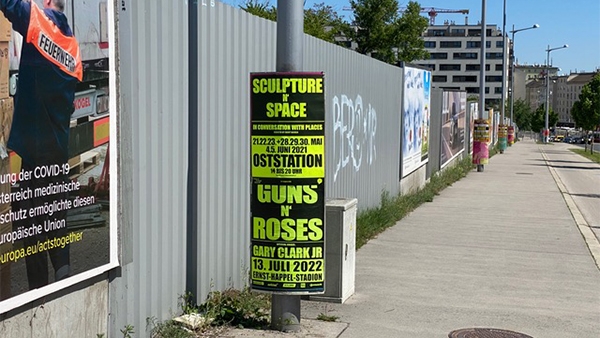About:“Artists talk a lot about ‘space’ and what they want to do with it: activate
it, respond to it, make it, occupy it, fill it, work with it, use it, choreograph it, read it, explore it. [...] I don’t like
the term ‘space’ because it implies something empty, neutral, and ahistoric — I don’t think such a thing exists. I prefer
the word ‘place.’ ‘Place’ comes with an address, a neighborhood, furniture, the cost of rent, rules, previous owners, street
noise, cracks in the wall, ghosts. I also don’t like the term ‘site-specific’ because it implies that there are moments when
something is not that. I like ‘site-responsive’: that a site is there doing its thing, and one can respond to it. It
implies conversation. The responses pile up, are different from each other, cling, and haunt. ‘Respond’ comes from the Latin respondere: re meaning
‘back’ and spondere meaning ‘to pledge.’ Like the site has pledged something to you, which you are now promising
to return.”
Johanna Hedva, Minerva the Miscarriage of the Brain, 2020
The exhibition
In Conversation with Places brings together new and existing work by students from the Sculpture and Space Department
of the University of Applied Arts in Vienna. At the outset, the participants were invited to consider the notion of “place”
as initial conceptual framework formulated by the author, artist, activist, and musician Johanna Hedva, and to conceive or
select works in direct response to the exhibition venue.
The notions of “space” and “place” have been contested
and the subject of analyses by a number of critical thinkers, artists, and scholars. For the feminist geographer and social
scientist Doreen Massey, the spatial is defined by and constructed of a multiplicity of social relations across time and space.
Rather than viewing space as a given, flat and motionless surface, for Massey, the spatial is inherently dynamic and formed
of interrelations on several levels. It holds no absolute independent dimension, nor it is connected to the idea of stasis.
It carries simultaneity and, therefore, is continuously built and rebuilt in an ever-evolving configuration of social relations.
An articulation of those relations constitutes what Massey refers to as place — an instance “constituted of the coming together
[…] in a precise point in space and time of a multiplicity of individual human and nonhuman trajectories that will disperse
again at their own rhythm.” [1]
By analogy, the process of working on the exhibition In Conversation with Places
might constitute one such instance in time and space. Following a number of site visits and conversations that took place
over the course of the academic semester, the participants were invited to engage in a conversation with the exhibition venue
Oststation am Kempelenpark and its history. Inaugurated in 1901 as a subsidiary company of the wire-rope factory Felten &
Guilleaume, which was originally founded in Germany in 1826, the building bears witness to the rapid industrialization of
18th- and 19th-century Europe which marked a transition from manufacturing to mechanized production. The company soon became
one of the main producers of wire-ropes and electric cables, exporting their wares across the globe. Today, the premises of
the former factory have been taken over by a real estate developer with the intention of transforming the larger area into
a new urban quarter comprising apartment buildings, an elementary school, a kindergarten, as well as a large public park at
the center. Expected to be demolished in fall 2021, Oststation has regularly been used for events, exhibitions, and other
projects including cultural initiatives since 2014. Traces of the location’s rich history, as both a factory and site of cultural
production, can be found in the building’s decaying structures that have been partly reclaimed by nature throughout the years.
The ways in which the participants of the exhibition responded to the site are multifaceted. While some of the works
engage with the space by adapting to, and expanding on, their immediate surroundings other make use of, or even appear to
be, material found on the premises, raising questions concerning property ownership and public sphere. Drawing from the participants’
respective practices and experience, the works unfold as a multiplicity of stories, observations, materials, and meanings,
conjuring up the bygone days of factory labor and various modes of production. For this exhibition, the premises of Oststation
have been revived as a site for social interaction and learning—with the activities of the class of the Sculpture and Space
department having moved from its permanent location at Paulusplatz in Vienna’s 3rd district to Oststation over the course
of the past weeks. Rather than being solely used as a site of production, the grounds of Oststation have served as a place
from which to work as well as exchange experience and be together. After all, it is not the location that constitutes a group
or an academic class, but the social interactions among its members, as well as their commonality and dissent. Through this
exhibition, those interactions may bring about the power to transform the surroundings—in conversation with the place.
Text: Fanny Hauser
May 21–23, May 28–30, June 4–5
2–8 pm
Oststation am Kempelenpark
Quellenstraße 2A, 1100 Wien
Bertrand Sergot and Anne-Laure Saives, Unplugged -
Relating place to organization: A situated tribute to Doreen Massey, in: M@n@gement 2016, 4, Vol. 19, 335–352. 



